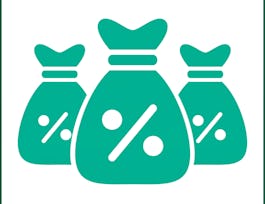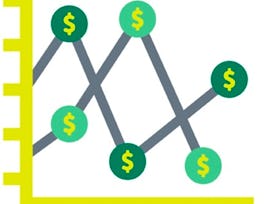If you haven’t considered what the competition is charging, you may not be maximizing your revenue. Spend time analyzing the market and you can influence price and improve margins. In this course, we'll show you how to implement competitive pricing and avoid common legal pitfalls of market-based pricing. You will also learn how to predict, influence and respond to competitors’ pricing moves. Developed at the Darden School of Business at the University of Virginia, and led by top-ranked Darden faculty and Boston Consulting Group global pricing experts, this course provides an in-depth understanding of market-based pricing and how to use it to capture more revenue.


Market and Competition in Pricing Strategy
This course is part of Pricing Strategy Optimization Specialization
Taught in English
Some content may not be translated



Instructors: Jean Manuel Izaret
11,146 already enrolled
Course
(224 reviews)
93%
Recommended experience
What you'll learn
Market and competition applications in product pricing
How to utilize game theory to influence market pricing
How to leverage competitor pricing models and knowledge of the product lifecycle to price products
Strategies for price discrimination in competitive markets
Skills you'll gain
Details to know

Add to your LinkedIn profile
13 quizzes
Course
(224 reviews)
93%
Recommended experience
See how employees at top companies are mastering in-demand skills

Build your subject-matter expertise
- Learn new concepts from industry experts
- Gain a foundational understanding of a subject or tool
- Develop job-relevant skills with hands-on projects
- Earn a shareable career certificate


Earn a career certificate
Add this credential to your LinkedIn profile, resume, or CV
Share it on social media and in your performance review

There are 4 modules in this course
Welcome! Competitive pricing is all about setting prices based on what companies with similar products and services charge. To use this approach effectively, you have to understand the playing field. In particular, you need to know general legal parameters that guide competition in the market place. In this module, you'll get basic background knowledge so that you can use market knowledge in your pricing strategy and still stay on the right side of antitrust law. Then Thomas will join you to introduce the competitive pricing framework , which you can use to assess pricing options, anticipate your competitors' pricing strategy, and determine whether to price to competition or to elasticity.
What's included
10 videos3 readings3 quizzes3 discussion prompts
Now that you know more about the playing field, let's take a look at how to predict competitive reactions. Thomas will show you value mapping, a tool that yields valuable insights into the value-price relationship relative to your competitors, and how to apply it in a real-world example. Then you'll dive into game theory, a field with many applications. Here, you'll use it anticipate and respond to price competition so that you can cooperate and compete without colluding.
What's included
10 videos3 quizzes1 discussion prompt
Disrupting competition and engaging in "coopetition" can benefit all players in the market--but not all the time. Using knowledge from game theory and pricing models can help you understand when this strategy can be beneficial. Thomas will introduce two competitor pricing models--price moves and price wars--and show you how to use these models to predict and respond to competitors. Then Ron will show you various strategies to optimize prices through the four phases of the product life cycle, from disruptive to declining products. Then you will use the SmartOps case to apply your knowledge of "coopetition" to analyze a real-world pricing decision.
What's included
13 videos1 reading3 quizzes2 discussion prompts
Price discrimination -- selling the same product to different market segments at different prices -- allows companies to optimize profits, even in competitive markets. It begins with customer segmentation, and Ron will show you practical segmentation strategies for both B2B and B2C contexts. Then you'll learn how to apply the Weber-Fechner Law, which sounds complicated, but is actually quite intuitive and useful when pricing quality-differentiated product lines. Finally, you'll learn the basics of bundle pricing and how to create economically sound bundles.
What's included
10 videos4 quizzes1 peer review1 discussion prompt
Recommended if you're interested in Marketing

University of Virginia

University of Virginia

University of Virginia

University System of Georgia
Why people choose Coursera for their career




Learner reviews
Showing 3 of 224
224 reviews
- 5 stars
86.16%
- 4 stars
13.39%
- 3 stars
0.44%
- 2 stars
0%
- 1 star
0%
New to Marketing? Start here.

Open new doors with Coursera Plus
Unlimited access to 7,000+ world-class courses, hands-on projects, and job-ready certificate programs - all included in your subscription
Advance your career with an online degree
Earn a degree from world-class universities - 100% online
Join over 3,400 global companies that choose Coursera for Business
Upskill your employees to excel in the digital economy
Frequently asked questions
Access to lectures and assignments depends on your type of enrollment. If you take a course in audit mode, you will be able to see most course materials for free. To access graded assignments and to earn a Certificate, you will need to purchase the Certificate experience, during or after your audit. If you don't see the audit option:
The course may not offer an audit option. You can try a Free Trial instead, or apply for Financial Aid.
The course may offer 'Full Course, No Certificate' instead. This option lets you see all course materials, submit required assessments, and get a final grade. This also means that you will not be able to purchase a Certificate experience.
When you enroll in the course, you get access to all of the courses in the Specialization, and you earn a certificate when you complete the work. Your electronic Certificate will be added to your Accomplishments page - from there, you can print your Certificate or add it to your LinkedIn profile. If you only want to read and view the course content, you can audit the course for free.
If you subscribed, you get a 7-day free trial during which you can cancel at no penalty. After that, we don’t give refunds, but you can cancel your subscription at any time. See our full refund policy.



